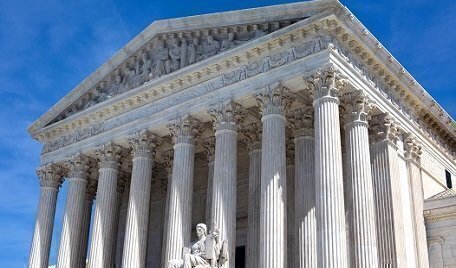Continuing to work through a series of disputes on “partisan gerrymandering,” the Supreme Court refused on Tuesday to add a third case to its review of that issue in the current term. Over two Justices’ dissents, the Court refused to put on a fast track a case testing the constitutionality of a North Carolina congressional districting map that led in 2016 to victory for 10 Republicans and only three Democrats, despite only a slight GOP edge in voting totals statewide.
 Last month, the Justices had put on hold a lower federal court ruling striking down that plan, drawn by the GOP-controlled legislature nearly two years ago. The lower court concluded that the district lines unconstitutionally favored Republican candidates at the expense of Democrats seeking House seats.
Last month, the Justices had put on hold a lower federal court ruling striking down that plan, drawn by the GOP-controlled legislature nearly two years ago. The lower court concluded that the district lines unconstitutionally favored Republican candidates at the expense of Democrats seeking House seats.
GOP legislative leaders conceded that they drew the lines explicitly to keep intact the 10 to 3 advantage their party’s candidates had under an earlier plan that was nullified in federal court for making too much use of race in drawing the lines.
The advocacy groups that had successfully claimed in the lower court that the new map was a partisan gerrymander in violation of the rights of the state’s Democratic voters asked the Justices two weeks ago to reactivate the case on the docket, using the state legislators’ prior request for delay as if it were a formal appeal.
The Court, those groups argued, should accept the case for full review, and set an expedited schedule for written arguments and hold a hearing in late April. On Tuesday afternoon, the Justices refused to do any of that, leaving the case to develop in the normal time frame. There was no explanation of the brief order. Justices Ruth Bader Ginsburg and Sonia Sotomayor dissented, saying they would have moved the case onto the faster schedule.
The Court already is reviewing two other cases on the constitutionality of partisan gerrymandering – one involving state legislative districts in Wisconsin, the other a single congressional district in Maryland. The denial of the plea to speed up the North Carolina case very likely means that the Court will take no action on the North Carolina dispute until after it has decided the other two cases.
Since those cases are not likely to be decided until late May or in June, that could be too late to develop a new redistricting plan for North Carolina for this year’s election, even if the Justices do rule that deliberate partisan favoritism in drawing election maps violates the Constitution.
The Court’s refusal to speed up the North Carolina case came one day after Justice Samuel A. Alito, Jr., acting alone, refused to let the Court become involved in reviewing a partisan gerrymandering decision issued last month by the Pennsylvania Supreme Court, based solely on the state constitution, on a map governing the election of that state’s 18 members of the U.S. House of Representatives. Alito’s action could mean that Pennsylvania will have a new plan, more or less free of partisan favoritism, in time for this year’s elections. The state legislature’s Republican leaders said on Tuesday they would “do our best” to draw up a new map to implement the state court ruling but added that they may yet try some other, unspecified challenge in a federal court.
In the North Carolina case, the organizations that won their case on the partisan advantage issue in the lower court had argued that their case might not be controlled by what the Justices decided in either of the pending cases from Wisconsin and Maryland. The North Carolina case, those groups contended, raises broader issues about partisan gerrymandering.
The Supreme Court has made clear in the past that it was not ruling out challenges that redistricting may be invalid if it is the result of too much partisanship, but it has never devised a judicial formula for deciding how much partisan favoritism violates the Constitution. Such a formula may emerge this term in one or both of the two cases under review.
Legendary journalist Lyle Denniston has written for us as a contributor since June 2011 and has covered the Supreme Court since 1958. His work also appears on lyldenlawnews.com.







